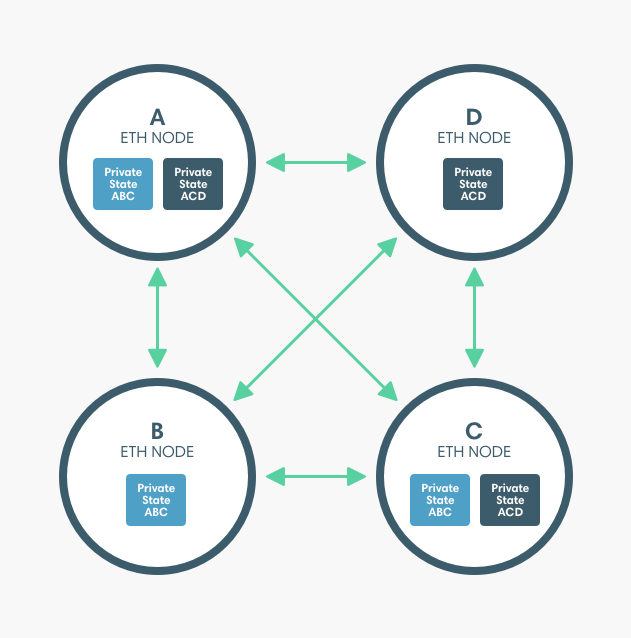Privacy groups
A privacy group is a group of nodes identified by a unique privacy group ID by Tessera. Tessera stores each private transaction with the privacy group ID.
The Besu nodes maintain the public world state for the blockchain and a private state for each privacy group. The private states contain data that is not shared in the globally replicated world state.
The privacy group implementations described below are offchain privacy groups and cannot have their group membership updated.
Privacy types
Besu implements two types of privacy:
- Enterprise Ethereum Alliance (EEA) privacy, where private transactions include
privateForas the recipient. - Besu-extended privacy, where private transactions include
privacyGroupIdas the recipient.
Both privacy types create privacy groups and store private transactions with their privacy group in Tessera.

For clarity, the Tessera nodes are not shown in the previous diagram. To send private transactions, each Besu node must have an associated Tessera node.
Access between states
A contract in a privacy group:
- Can read or write to a contract in the same privacy group.
- Can read from the public state including public contracts.
- Cannot access contracts from a different privacy group.
A public contract cannot access a private contract.
Enterprise Ethereum Alliance privacy
In the privacy implementation complying with the EEA Client Specification the group of nodes specified by privateFrom and privateFor form a privacy group with a unique privacy group ID provided by Tessera.
The previous diagram illustrates two privacy groups enabling:
- A, B, and C to send transactions that are private from D.
- A, C, and D to send transactions that are private from B.
Using EEA-compliant privacy, to send private transactions between A, B, and C, A initializes a contract in a private transaction with B and C specified as the privateFor and A specified as the privateFrom. Initializing the contract creates a privacy group consisting of A, B, and C. For the ABC private state to remain consistent, A, B, and C must be included on transactions (as either privateFrom or privateFor) even if they are between only two of the three parties.
To send private transactions between A, C, and D, C initializes a different contract in a private transaction with A and D specified as the privateFor and C specified as the privateFrom. Initializing the contract creates a privacy group consisting of A, C, and D. For the ACD private state to remain consistent, A, C, and D must be included on transactions (as either privateFrom or privateFor) even if they are between only two of the three parties.
Besu-extended privacy
The Besu-extended privacy implementation creates a privacy group using priv_createPrivacyGroup with private transactions sent to the privacy group ID.
Using the same privacy groups as in the previous example.
Using Besu-extended privacy, to send private transactions between A, B, and C, A creates a privacy group consisting of A, B, and C. The privacy group ID is specified when sending private transactions and A, B, and C are recipients of all private transactions sent to the privacy group.
To send private transactions between A, C, and D, A creates a privacy group consisting of A, C, and D. The privacy group ID of this group is specified when sending private transactions with A, C, and D as recipients.
Multi-tenancy
When using multi-tenancy with privacy groups, each user provides a JSON Web Token (JWT) which allows Besu to check that the user has access to functionality and data associated with a privacy group.